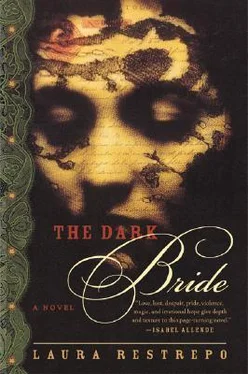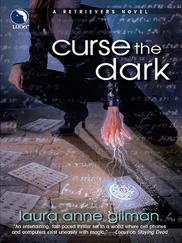“Wherever you put your hand on him you find a lot of man,” she sighed.
Was his hair very dark? Dark and light, black and white, both mixed. And what was it that had been beating in his forehead: the promise of bliss, or had it been a forsworn good-bye from the very beginning? She couldn’t tell for sure, even when he had been with her, the memory of which is now blurred into the long string of symmetrical days.
After his head, his arms were forgotten and the imprint of his embrace became nebulous, and she lost the sensation of his neck in spite of that time when he turned his back; his legs also evaporated, and she could no longer distinguish them from the legs of other men, not to mention his feet — so absent were they that Sayonara convinced herself that when they were making love, Payanés had never removed his socks. Even his hands faded and the last traces of his caresses turned into smoke. But his chest remained, Payanés’s chest, and it became as immense as the universe.
“In the memory of that chest,” Fideo assures me, “Sayonara built her home.”
A chest opened in embrace, protective like the chest of God or of any other father, as old as an elephant and soft like a bed, and warm: without cracks where the wind could slip through. Not the narrow chest of a boy, not a chest covered with hair, or wounded by a spear near the heart; not one of those sharp, lean chests like the ribs of a ship, or the muscular thorax of an athlete, none of that; not the chest of a general, loaded down with medals. But a spacious chest, sufficient, familiar and wise, ample like a hangar; abundant with milk and honey like the breasts of a woman; a chest with the dim light of a church and the well-being of a stove, with thick stone walls, high ceilings under friendly heavens, and a big wooden door that opened just enough for her. That chest.
“I say,” says Fideo, “that she confused the memory of what it was with what she wanted it to be.”
A chest that gives itself to you without your having to ask and that doesn’t make you wait, that doesn’t fear, doesn’t frighten, doesn’t delay; a chest that doesn’t hold back, or measure, or stop, or mistrust, or calculate; our house, a generous chest like a banquet; crypt and castle, a cave of sleeping mammals, while outside the winter roars and blows: a flowery bed.
“Too much wishing for things that don’t exist in this real world. What you’re looking for is not a man, girl,” suspected Fideo, “but to die and go to heaven.”
“Maybe.”
“One day she told me about Lucía,” Fideo tells me. “She told me she had been tangled up with that woman for a good while.”
There were alienating months during which Amanda lived twenty-four hours a day with a woman she had never seen nor ever would, but whom she came to know better than a sister. It was Lucía, the wife Payanés kept in Popayán and who had been, according to him, the reason for his distance, for the rupture, for the tantrum that night by the river and all the turns that fate later took as a consequence. Sayonara, who didn’t know her real name, began calling her Lucía, a name she thought sounded cold, caustic, sonorous, and haughty. She could well have won easy points and gotten the early advantage by baptizing her Ramona, or Chofa, or Filomena, but she suspected that it would be an improper tactic and an imprudent approach to ridicule or minimize her adversary.
“So it was Lucía,” says Fideo, repeating Amanda’s words.
Before she knew it, she was having breakfast, lunch, and dinner with this Lucía; she even gargled with her, but gargled with cyanide, because she was being poisoned, and if she didn’t leave Lucía’s side day or night, even though she hated the woman, it was because after all it was only with her that Amanda could vent her feelings and because she hadn’t found anyone else with whom she could maintain that uninterrupted, circular, and useless dialogue on the man doubly absent: for one and the other, because of the fault of one or the other.
“Here we are, tearing each other’s hair out of love for him,” said Sayonara to Lucía, “and he’s probably out there somewhere, with Molly firmly planted on his lap.”
The more force she applied to erasing Lucía from the map, the more persistent she became, and the more present, until the day came when Amanda felt that the faceless, ageless woman had installed herself permanently in her kitchen, always there, invoked by her and sitting on a stool, like another tenant except invisible to Sacramento and the girls, with her disheartening message on the tip of her tongue, sometimes resentful and tearful, other times furiously demanding what belonged to her, but always invincible in the tenacity with which she had determined not to go away, even though her hostess called her bruja, nightmare, pain, that woman, her.
“All that was missing was for me to serve her a cup of coffee every morning,” Amanda said to Fideo, and she also told her that she finally understood that she thought more about Lucía than she did about Payanés, and probably even more than did Payanés himself, who in Amanda’s eyes was becoming less her old love and more the actual husband of that phantasmagoric Lucía.
“It’s me who is giving him to Lucía,” Sayonara said to herself, alarmed, and she decided to make peace with the woman, give back her human qualities and her right not to be a miscreant or a succubus, and she stopped wishing for her character to be sour or for her to have sagging tits and bad breath.
Simultaneously she gave Lucía the peremptory order to leave her mind and license to exist out there, in her own environment, so that they wouldn’t have to continue stepping on each other’s toes or beating on each other like a couple of boxers fighting over the close quarters in the ring, the gold medal, and the single portion of air. From then on she ignored the other woman’s company, even though she had become so necessary, and she said adiós, hopefully forever, and while at first there was an absence, later she felt strong without Lucía and satisfied at having unencumbered herself of that dual and unbearable alliance, of complicity and rivalry, with a stranger.
“Of course, from time to time Lucía returned,” Fideo tells me, “but more faintly and only to make courtesy visits. She would sit silently on her stool, drink her black coffee, say thank you, ask permission to withdraw, and she would return to Popayán, her native city.”
From the first moment, when I first saw the photograph of Sayonara, I had the feeling that she had died under violent circumstances. Just as I had guessed that she was a prostituta from her crudely plucked eyebrows and her soft, cold gaze that was like the touch of silk; just as I suspected — erroneously — that her name was Clara, in contrast with the dark light she radiated; and as I remember having thought that she possessed the sort of beauty that opens the door to death.
I have followed the occurrences in her life, trying to record her slight footprint and her uncertain trail. The Girl, Sayonara, and Amanda: I have witnessed three different people and I haven’t been able to fully integrate them into a true and definitive identity. And I would only be able to do it poorly, as I am convinced that not even she could do it.
“I am divided inside, Doc,” Dr. Antonio María tells me that he heard her lament once, “and each of those who live in me pulls in her own direction. I’m tired, Doc, of all the pulling, it is nearly tearing me apart, and I want to rest as one single person.”
“We’re all like you, divided,” the doc tells me he said to her, “but when we are one and able to rest, it’s because we’re dead.”
Читать дальше












